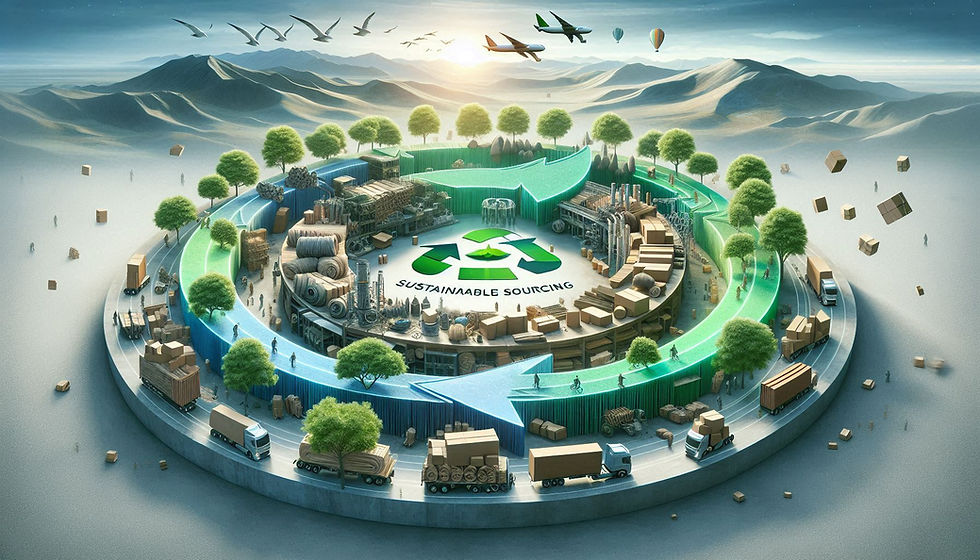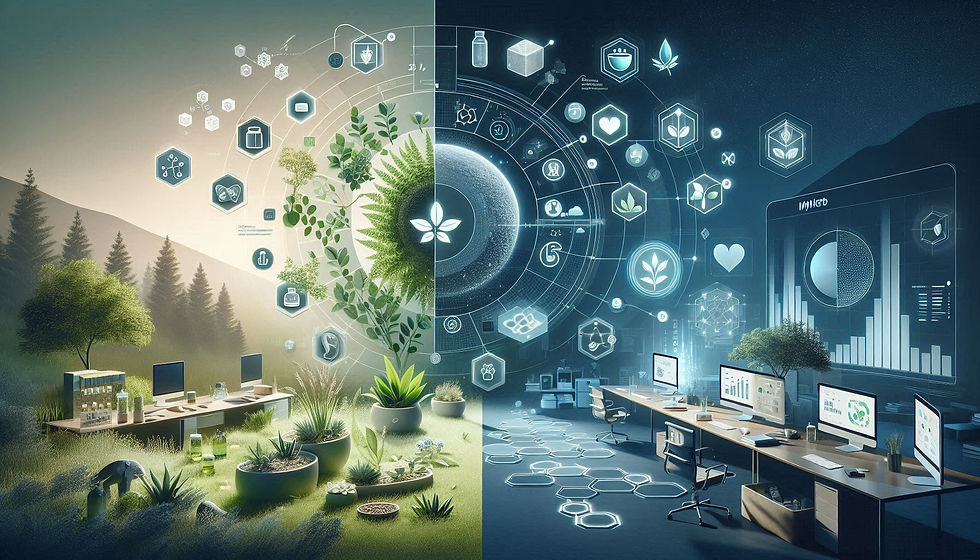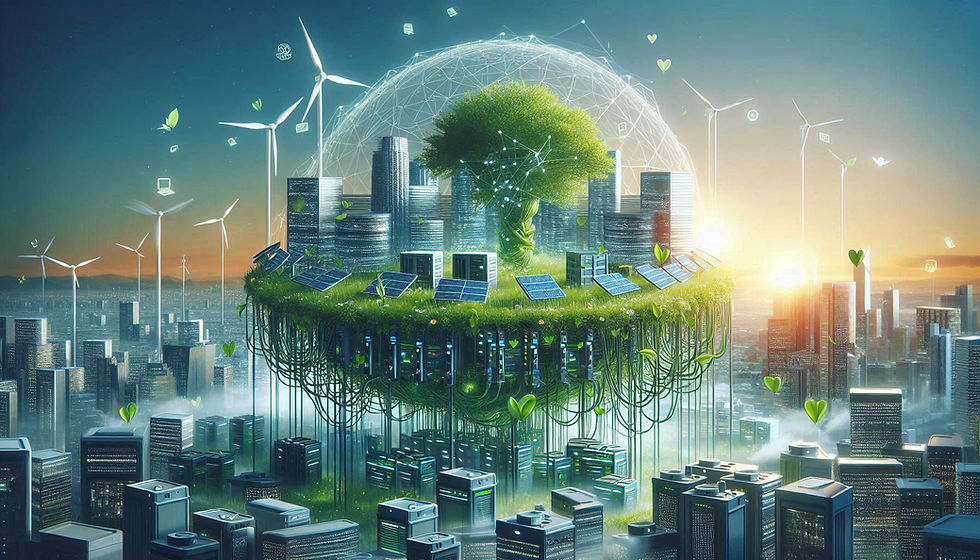Beyond the Label: What "Sustainably Sourced" Really Means in the Digital Age
- Aaron Levin
- Jul 24
- 6 min read
Updated: Sep 17
In an era of conscious consumerism, the term "sustainably sourced" has become a ubiquitous signifier of ethical and responsible production. But what does this label truly represent?

Moving beyond the marketing buzz, a deeper look reveals a complex and evolving landscape where the ethical treatment of both people and our planet is paramount.
In the digital age, technology is playing a transformative role, offering unprecedented transparency and accountability in the journey of a product from its origin to the consumer. Learn more about ethical practices here and explore how technology drives transparency here.
This article delves into the heart of sustainable sourcing and fair trade, exploring how innovative technologies like blockchain are revolutionizing supply chains and empowering consumers to make more informed choices. We'll also hear from sourcing specialists and tech innovators who are at the forefront of this movement.
Defining the Terms: A Foundation of Fairness
At its core, sustainable sourcing is the integration of social, ethical and environmental performance factors into the process of selecting suppliers. It’s a holistic approach that considers the entire lifecycle of a product.
As EcoVadis, a trusted provider of business sustainability ratings, explains, the ultimate goal is to "build strong, long-term relationships with suppliers" by improving performance on environmental, social, and ethical issues.
This commitment extends to the people involved in the supply chain. Fair Trade, a global movement with a focus on producers in developing countries, advocates for "paying higher prices to exporters and improving social and environmental standards](https://www.fairtrade.net/impact/social-impact)."

The Fairtrade Foundation emphasizes a vision of a world where all producers enjoy secure and sustainable livelihoods, fulfil their potential, and decide on their future. This is achieved through a set of Fairtrade standards that ensure fair wages, safe working conditions, and the prohibition of forced and child labor.
The ethical treatment of the planet is another critical pillar. This involves minimizing environmental impact through practices like reducing greenhouse gas emissions (Learn more about greenhouse gas emissions), conserving water (Discover water conservation methods), protecting biodiversity (Explore biodiversity protection), and avoiding deforestation (Understand deforestation and its impact).
Companies that prioritize ethical and sustainable sourcing recognize that their responsibility extends beyond their operations to the entire supply chain (Read about sustainable sourcing).
The Technological Revolution: Blockchain for Unprecedented Transparency
For years, the complexity of global supply chains has made it difficult for companies and consumers to verify claims of sustainability and fair trade. This is where technology, and specifically blockchain, is making a groundbreaking impact.
Blockchain, the technology that underpins cryptocurrencies, is essentially a decentralized and immutable digital ledger.
Learn more about blockchain technology. When applied to supply chains, it can create a permanent and tamper-proof record of every transaction, from the raw material to the finished product. Discover the impact of blockchain on supply chains.
How does it work?
Imagine a coffee bean's journey from a small farm in South America to your cup. With blockchain, every step of that journey can be recorded as a "block" of information on a shared digital chain.
This includes details like the farm's location. Learn more about farm locations, the date of harvest, understand harvest dates, and fair trade certifications. Explore fair trade certifications, processing information.
Discover processing methods, shipping details, Track shipping details, and more. Each block is cryptographically linked to the previous one. How blockchain works, creating a secure and unbroken chain of custody. Why chain of custody matters.
The benefits of this technology are manifold:
Enhanced Transparency: All participants in the supply chain, from the farmer to the consumer, can have access to the same information, fostering trust and accountability.
Improved Traceability: In the event of a problem, such as a product recall or a question about a supplier's practices, blockchain allows for quick and easy tracing of the product back to its source.
Fraud Prevention: The immutable nature of the blockchain makes it extremely difficult to alter or tamper with records, reducing the risk of counterfeit products and fraudulent claims.
Empowerment for Consumers: By scanning a QR code on a product's packaging, consumers can access the product's entire history, allowing them to make purchasing decisions that align with their values.

Insights from the Experts: A Look into the Future of Sourcing
To gain a deeper understanding of the challenges and opportunities in this space, we turn to the experts.
Geraint John, a supply chain researcher, highlights the growing demand from consumers for transparency:
"They want to know where the ingredients come from and who grows them; they want to know how their food is produced and the conditions of the animals, farmers, and other workers involved; and they want to know about the environmental policies and track records of the companies whose products they buy" (source).
This sentiment is echoed by tech innovators who are building the tools to meet this demand. The consensus is that while the initial implementation of technologies like blockchain can be a significant undertaking, the long-term benefits in terms of risk mitigation, brand reputation, and consumer trust are undeniable.
However, the journey to full supply chain transparency is not without its challenges. These include the need for industry-wide collaboration, the cost of implementation, and the digital literacy of all participants in the supply chain.

Despite these hurdles, the momentum is clear. As one sourcing specialist puts it, "The question is no longer if companies will adopt these technologies, but when and how."
Conclusion: A Call for Conscious Consumption
Sustainably Sourced: A Promise and the Importance of "Sustainably Sourced."
The "sustainably sourced" label is a commitment to a fair and environmentally responsible world, indicating that resources are managed to meet current needs without hindering future generations. For more on sustainability, visit United Nations Sustainable Development Goals.
Technology's Role in Verification
Technology, like blockchain, verifies this commitment by tracing product origins to ensure sustainable sourcing. Discover more about blockchain's impact on supply chains at IBM Blockchain.
Benefits of Sustainable Sourcing
Supporting sustainably sourced products helps consumers contribute to a sustainable future. For more on sustainable practices, visit WWF's Sustainable Sourcing Page.
Understanding Sustainably Sourced
To learn more about what sustainably sourced means, you can visit Sustainable Sourcing.
Technology's Role
For insights on how technology is aiding in verifying sustainable sourcing, check out Tech for Good.
Impact on the Environment
To explore the environmental impacts of sustainable sourcing, refer to Environmental Sustainability.
Equity and Responsibility
For a deeper understanding of the social equity aspects of sustainable sourcing, visit Social Responsibility.
Embracing Innovations in Supply Chains
By embracing innovations like blockchain, companies can build more resilient and transparent supply chains. This technology allows for enhanced traceability and security, ensuring that products are sourced ethically and sustainably.
Empowering Consumers
Consumers are empowered to make choices that have a positive impact on both people and the planet.
Through platforms that utilize blockchain technology, individuals can verify the origins of the products they purchase, supporting ethical brands and reducing their environmental footprint.
Benefits of Blockchain in Supply Chains
Increased Transparency: Blockchain provides an immutable record of transactions, making it easier to track the journey of products.
Enhanced Efficiency: By streamlining processes and reducing paperwork, blockchain can significantly improve operational efficiency.
Risk Mitigation: Companies can better manage risks associated with supply chain disruptions by using blockchain to monitor and respond to changes in real time.
Conclusion
In conclusion, the integration of blockchain technology into supply chains not only benefits companies by enhancing resilience and transparency but also empowers consumers to make informed decisions that positively impact society and the environment.
The future of sourcing is one w here every product tells a story, and every consumer has the power to listen.



Comments